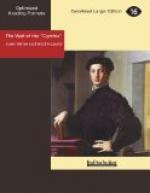She had arisen from her arm-chair, and was looking kindly at him. Suddenly her eyes dilated, her lips trembled, and she stretched out her hands toward him.
“My son! you are my son!” she cried.
Then she advanced a step toward Erik.
“Yes, you are my child,” she said. “Your father lives over again in you!”
When Erik, bursting into tears, fell on his knees before her, the poor woman took his head in her hands, and fainted from joy and happiness as she tried to press a kiss on his forehead.
CHAPTER XXII.
AT VAL-FERAY.
A month later at Val-Feray, an old homestead of the family, situated half a league from Brest, Erik’s adopted family were assembled, together with his mother and grandfather. Mrs. Durrien had, with the delicacy of feeling habitual to her, desired that the good, simple-hearted beings who had saved her son’s life should share her profound and inexpressible joy. She had insisted that Dame Katrina, and Vanda, Mr. Hersebom, and Otto should accompany Doctor Schwaryencrona, Kajsa, Mr. Bredejord, and Mr. Malarius, and they held a great festival together.
Amidst the rugged natural scenery of Breton and near the sea, her Norwegian guests felt more at their ease than they could have done in Varennes Street. They took long walks in the woods together, and told each other all they knew about Erik’s still somewhat obscure history, and little by little many hitherto inexplicable points became clear. Their long talks and discussions cast light upon many obscure circumstances.
The first question they asked each other was, Who was Tudor Brown? What great interest did he have in preventing Patrick O’Donoghan from telling who Erik’s relations were? The words of that unfortunate man had established one fact, viz., that Tudor Brown’s real name was Jones, as it was the only one that the Irishman had known him by. Now, a Mr. Noah Jones had been associated with Erik’s father in working a petroleum mine, that the young engineer had discovered in Pennsylvania. The simple announcement of this fact gave a sinister aspect to many events which had so long appeared mysterious: the suspicious wreck of the “Cynthia,” the fall of the infant into the sea, perhaps the death of Erik’s father. A document that Mr. Durrien found among his papers elucidated many of these perplexing questions.
“Several months before his marriage,” he said to Erik’s friends, “my son-in-law had discovered, near Harrisburg, a petroleum well. He lacked the capital necessary to purchase it, and he saw that he was in danger of losing all the advantages which the possession of it would secure to him. Chance made him acquainted with Mr. Noah Jones, who represented himself as a cattle dealer from the far West. But in reality, as he found out afterward, he was a slave-trader.




